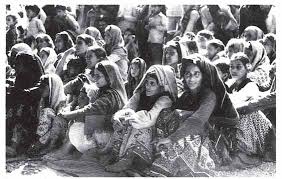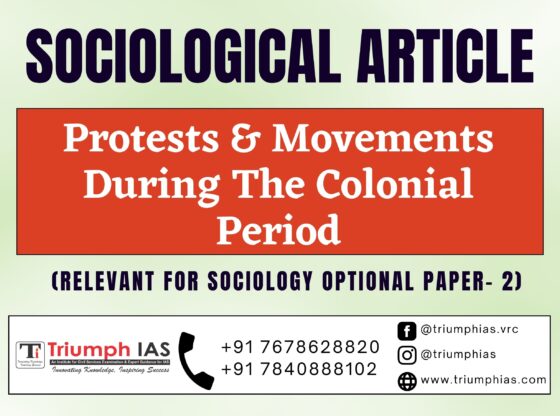Protests & Movements During The Colonial Period
Relevant for sociology optional Paper- 2 (Unit- 11 : Introducing Indian Society)

During the colonial period, India experienced significant political and social changes. These changes were driven in large part by the emergence of protests and movements that challenged the authority of the British colonial government. These protests and movements were diverse, ranging from political movements like the Indian National Congress to social movements like the Dalit movement and the women’s movement. In this essay, we will examine the history and impact of protests and movements during the colonial period, and the implications of this process for contemporary Indian society.
The emergence of protests and movements during the colonial period was driven by a range of factors. One of the key factors was the oppressive policies and practices of the British colonial government. The British exploited Indian resources and labour to enrich their own country, and they systematically excluded Indians from positions of power and authority in the colonial government. The British also introduced new laws and customs that challenged traditional Indian ways of life, such as the abolition of sati and the introduction of English education. These policies and practices led to growing resentment among Indians, and this resentment eventually gave rise to protests and movements against the British colonial government.
The Indian National Congress was one of the most significant political movements during the colonial period. The Congress was founded in 1885 to promote Indian interests and to press for greater Indian participation in the colonial government. The Congress played an important role in the Indian independence movement and was instrumental in securing Indian independence in 1947. Other political movements during the colonial period included the Muslim League, which advocated for the rights of Indian Muslims, and the All India Trade Union Congress, which advocated for the rights of Indian workers.
Social movements during the colonial period included the Dalit movement, the women’s movement, the labor movement, and the peasant movement. The Dalit movement was a movement to secure greater rights and representation for India’s untouchable castes. The women’s movement was a movement to secure greater rights and representation for women in Indian society. The labour movement was a movement to secure better working conditions and wages for Indian labourers. The peasant movement was a movement to secure better land rights and protections for Indian peasants.
These movements had a significant impact on Indian society. They helped to mobilize Indians against the British colonial government and were instrumental in securing Indian independence. They also played an important role in shaping the political, social, and cultural landscape of modern India. The Indian National Congress, for example, played an important role in shaping the democratic institutions and values of modern India. The Dalit movement and the women’s movement also helped to secure greater rights and representation for historically marginalized groups in Indian society.
However, the legacy of these movements is also complex and multifaceted. The Indian independence movement was marked by significant communal violence between Hindus and Muslims, and this violence has had lasting implications for contemporary Indian society. The legacy of the women’s movement is also complex, as women in contemporary India continue to face significant social, economic, and political challenges.
In conclusion, protests and movements during the colonial period played a significant role in shaping the history and development of modern India. These movements challenged the authority of the British colonial government and helped to secure Indian independence. They also helped to secure greater rights and representation for historically marginalized groups in Indian society. However, the legacy of these movements is complex and multifaceted, and they continue to shape the ongoing process of social change in India.
For more such free UPSC notes, Articles, News & Views Join our Telegram Channel. https://t.me/triumphias
Click the link below to see the details about the UPSC – Civils courses offered by Triumph IAS. https://triumphias.com/pages-all-courses.php


